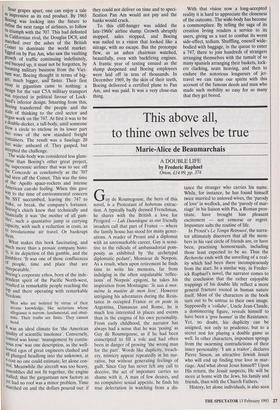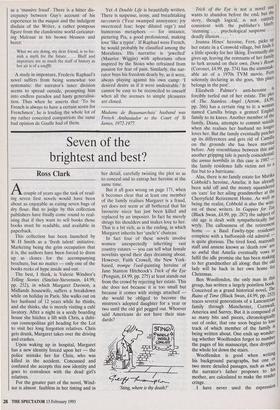This above all, to thine own selves be true
Marie-Alice de Beaumarchais
A DOUBLE LIFE by Frederic Raphael Orion, £14.99, pp. 374 Guy de Roumegouse, the hero of this novel, is a Protestant of hobereau extrac- tion. A typically badly dressed Frenchman, he shares with the British a love for POrigord — Lah Dawrdogne as our friendly invaders call that part of France — where the family house has stood for many gener- ations. A reader of Proust and a diplomat with an unremarkable career, Guy is sensi- tive to the ridicule of ambassadorial pom- posity as exhibited by 'the archetypal diplomatic pedant', Monsieur de Norpois. As a result, when upon retirement he finds time to write his memoirs, far from indulging in the often unpalatable 'reflec- tions' of Norpois' epigoni, he takes his inspiration from Montaigne: :le suis a moi- meme la matiere de mon livre'. However intriguing his adventures during the Resis- tance in occupied France or en poste in Argentina, Damascus and Rome, he is much less interested in places and events than in the enigma of his own personality. From early childhood, the narrator has always had a sense that he was 'posing' as Guy de Roumegouse, as if he had been conscripted to fill a role and had often been in danger of proving 'the wrong man for the part'. Words like duplicity, treach- ery, mimicry appear repeatedly in his nar- rative, but without generating feelings of guilt. Since Guy has never felt any call to deceive, the act of imposture carries no shame with it. A man of few desires, and no compulsive sexual appetite, he finds his true delectation in watching from a dis-
tance the stranger who carries his name. While, for instance, he has found himself twice married to unloved wives, the 'parody of love' in wedlock, and the 'parody of mar- riage' in his liaison with Pia, a Roman pros- titute, have brought him pleasant excitement — not remorse or regret. Imposture salts the routine of life.
In Proust's Le Temps Retrouve, the narra- tor ultimately discovers that all the mem- bers in his vast circle of friends are, or have been, practising homosexuals, including those least expected to be so. Thus the Recherche ends with the unveiling of a real- ity which had been there inconspicuously from the start. In a similar way, in Freder- ick Raphael's novel, the narrator comes to the conclusion that the rather enjoyable trappings of his double life reflect a more general fracture rooted in human nature itself. Most of the characters in the book turn out to be untrue to their own image. Supposedly a `collabo', Uncle Jean-Claude, a domineering figure, reveals himself to have been a Bros bonnet' in the Resistance. Yet, no doubt, his duplicity can be assigned, not only to prudence, but to a secret zest for playing a double game as well. In other characters, imposture springs from the swarming contradictions of their inner personality: 'I am a traitor', declares Pierre Simon, an attractive Jewish Jesuit who will end up finding true love in mar- riage. And what about Jesus himself? Upon His return, the Jesuit suspects, He will be more at home with the Jews, his family and friends, than with the Church Fathers.
History, let alone individuals, is also seen
as a 'massive fraud'. There is a bitter dis- crepancy between Guy's account of his experience in the maquis and the indulgent disdain of the Writer, a rather pompous figure from the clandestine world caricatur- ing Malraux in his brown blouson and beret:
What we are doing, my dear friend, is to fur- nish a myth for the future . . . Bluff and imposture are as much the stuff of history as hot air is of a soufflé.
A study in imposture, Frederic Raphael's novel suffers from being somewhat too systematic: the narrator's inner division seems to spread outside, prompting him into endless paradox and hasty generalisa- tion. Thus when he asserts that 'To be French is always to have a certain scorn for Frenchmen', he is lending the whole lot of my rather conceited compatriots the same bad opinion de Gaulle had of them.
Yet A Double Life is beautifully written. There is suspense, irony, and breathtaking raccourcis (Tear swamped annoyance; joy sweetened fear; hope diluted rage') and humorous metaphors — for instance, picturing Pia, a good professional, making love 'like a typist'. If Raphael were French, he would probably be classified among the Moralistes. His narrative is 'jewelled' (Maurice Wiggin) with aphorisms often inspired by the Stoics who refrained from passion for fear of pain. Similarly, the nar- rator buys his freedom dearly by, as it were, always playing against his own camp: 'I desired desire as if it were undesirable.' It cannot be easy to be reconciled to oneself when all the avenues to simple pleasures are closed.
Madame de Beaumarchais' husband was French Ambassador • to the Court of St James, 1972-1977.



















































 Previous page
Previous page